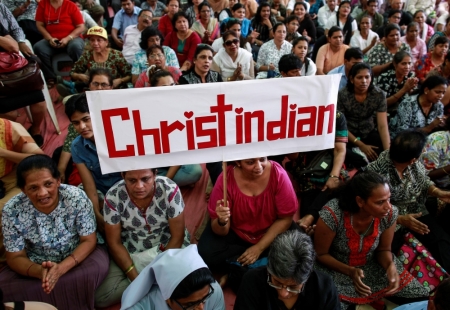India: Christian persecution watchdog fears police orders to surveil Christians’ activities will increase attacks on believers

As Christian persecution continues to rise in India, all police stations in one district have been ordered to keep surveillance on Christians and report on any "conversion” activities. A U.S.-based persecution watchdog group now fears that attacks on Christians might intensify.
The Superintendent of Police of the Sukma District in Chhattisgarh state has issued a circular to all police stations directing officers to surveil the district’s Christian community and be on the lookout for “fraudulent” religious conversions and to act against Christians where these activities are found, International Christian Concern reports.
Several incidents of intimidation, threats and assaults against the Christians of Sukma have been reported since the circular was sent, ICC reports.
“Four policemen came to our village while we were having a prayer gathering on July 23,” Bhima, a Christian from Sukma, was quoted as saying. “They enquired about conversions. They did not do anything to us, but after the police left the Hindu radicals in the village started using abusive words against all Christians. They threatened that they would chase us away from the village.”
Another local pastor was quoted as saying that all churches in the villages had been forced to stop all the worship gatherings.
Christians make up about 2.5% of India’s population, while Hindus comprise 79.5%.
India ranks as the 10th worst country globally when it comes to Christian persecution, according to Open Doors USA's 2021 World Watch List. The U.S. Commission on International Religious Freedom has urged the U.S. State Department to label India as a “country of particular concern” for engaging in or tolerating severe religious freedom violations.
The Evangelical Fellowship of India says in a report that it documented 145 cases of atrocities against Christians — three murders, 22 attacks on churches and 20 cases of ostracization or social boycott in rural areas — in the first half of 2021.
“The violence, detailed in the report, itself was vicious, widespread and ranged from murder to attacks on churches, false cases, police immunity and connivance, and the now normalized social exclusion or boycott which is becoming viral,” the report says.
“Since the current ruling party (Bharatiya Janata Party) took power in 2014, incidents against Christians have increased, and Hindu radicals often attack Christians with little to no consequences,” noted Open Doors’ World Watch List last year.
“The view of the Hindu nationalists is that to be Indian is to be Hindu, so any other faith — including Christianity — is viewed as non-Indian. Also, converts to Christianity from Hindu backgrounds or tribal religions are often extremely persecuted by their family members and communities,” Open Doors said at the time.
Several Indian states have “anti-conversion” laws, which presume that Christian workers “force” or give financial benefits to Hindus to convert them to Christianity.
In July, at least 30 Christians were falsely accused of engaging in forced religious conversions and arrested in India’s most populous state of Uttar Pradesh, according to ICC.
“Like we have seen in other states, Uttar Pradesh’s anti-conversion law provides a legal cover for radical Hindu nationalists seeking to persecute Christians,” ICC’s Regional Manager for South Asia, William Stark, said. “If the government of Uttar Pradesh allows this to continue, radical Hindu nationalists will know they have absolute impunity to harass Christians and close down their places of worship.”
While the anti-conversion laws have been in place for decades in some states, no Christian has been convicted of “forcibly” converting anyone to Christianity. These laws, however, allow Hindu nationalist groups to make false charges against Christians and launch attacks on them under the pretext of the alleged forced conversion.
Some of these laws state that no one is allowed to use the “threat” of “divine displeasure,” meaning Christians cannot talk about Heaven or Hell, as that would be seen as “forcing” someone to convert. And if snacks or meals are served to Hindus after an evangelistic meeting, that could be seen as “inducement.”





















